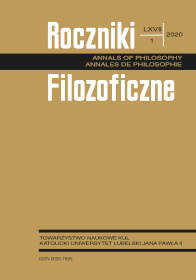„Est Deus Omnino Simplex?”: The Simplicity of God According to Thomas Aquinas
Abstract
Throughout the centuries, the doctrine of divine simplicity laid at the heart of Christian theology. In Thomas Aquinas’ mature thought, simplicity occupies a privileged place among other attributes of God. A simple (or completely) simple being is a being that does not consist of any parts or constituents. God’s being simple means that he does not exhibit any of the seven (and according to Aquinas the only possible) types of composition. The arguments that serve as the justification for this thesis can be divided into four groups which I labeled: the argument from the lack of potentiality, the argument from the priority of parts to the whole, the argument from the anterior maker and the argument from perfection. All of them begin with identifying God with the first cause of all things and add other premises that are specific to them. The first argument — that the first cause does not have potentiality and every composite being does have it. The second — that everything that is composite depends on it’s parts while the first cause is not dependent upon anything. The third — that every composite being needs a cause or explanation and the first cause has neither. The fourth — that the first cause is a perfectly good being and such a being cannot be composite. The analyses that were conducted show that the first two reasonings seem to be unsound. The third of the arguments provides a fine justification for the thesis in question. The fourth may serve as an additional, but weaker justification for it.
References
Arystoteles. Metafizyka. Przełożył Kazimierz Leśniak. W: idem, Dzieła wszystkie. T. 2. Warszawa: PWN, 1990.
Brower, Jeffrey. „Matter, Form and Individuation”. W: The Oxford Handbook of Aquinas, red. Eleonore Stump i Brian Davies, 85–103. Oxford, New York: Oxford University Press, 2012.
Hughes, Christopher. On a Complex Theory of a Simple God. Ithaca, London: Cornell University Press, 1989.
O’Connor, Timothy. „‘This All Men Call God’”. Faith and Philosophy 21 (2004): 417–435.
Piwowarczyk, Marek. Prostota Boga, w: Filozofia Boga. Część II. Odkrywanie Boga, red. Stanisław Janeczek i Anna Starościc. Lublin: Wydawnictwo KUL, 2017.
Przanowski, Mateusz. 2010. Wprowadzenie do kwestii VII: O prostocie Bożej istoty, w: św. Tomasz z Akwinu, Kwestie dyskutowane o mocy Boga. T. IV. (Ad Fontes, 17), red. Mateusz Przanowski OP i Jan Kiełbasa, 5–62 Kęty. Warszawa: Wydawnictwo Marek Derewiecki — Instytut Tomistyczny.
Stump, Eleonore. Aquinas. London, New York: Routlege, 2003.
Swinburne, Richard. The Christian God. New York: Oxford University Press, 1994.
Tomasz z Akwinu, św. Byt i istota. Przełożył Władysław Seńko. (Ad Fontes, 10). Kęty: Wydawnictwo Marek Derewiecki, 2009.
Tomasz z Akwinu, św. Kwestia o duszy. Przełożyli Zofia Włodek i Włodzimierz Zega. Kraków: Wydawnictwo Znak, 1996.
Tomasz z Akwinu, św. Kwestie dyskutowane o mocy Boga. Przełożyli Magdalena Bieniak-Nowak i in. (Ad Fontes, 17). T. IV: O prostocie Bożej istoty; O tym, co odwiecznie relacyjnie orzeka się o Bogu, red. Mateusz Przanowski OP i Jan Kiełbasa. Kęty, Warszawa: Wydawnictwo Marek Derewiecki — Instytut Tomistyczny, 2010.
Tomasz z Akwinu, św. Summa contra gentiles: prawda wiary chrześcijańskiej w dyskusji z poganami, innowiercami i błądzącymi. Przełożyli Zofia Włodek i Włodzimierz Zega. (Biblioteka Christianitas: najważniejsze książki chrześcijaństwa, 14). T. I. Poznań: Wydawnictwo Polskiej Prowincji Dominikanów „W drodze”, 2003
Tomasz z Akwinu, św. Traktat o Bogu. Summa teologii, kwestie 1–26. Przełożyła Gabriela Kurylewicz i in. Kraków: Wydawnictwo Znak, 2001.
Weigel, Peter. Aquinas on Simplicity: an Investigation into the Foundations of his Philosophical Theology. Bern: Peter Lang, 2008.
Wolterstorff, Nicholas. „Divine simplicity”. Philosophical Perspectives 5: Philosophy of Religion 1991: 531–552.
Copyright (c) 2020 Roczniki Filozoficzne

This work is licensed under a Creative Commons Attribution-NonCommercial-NoDerivatives 4.0 International License.





